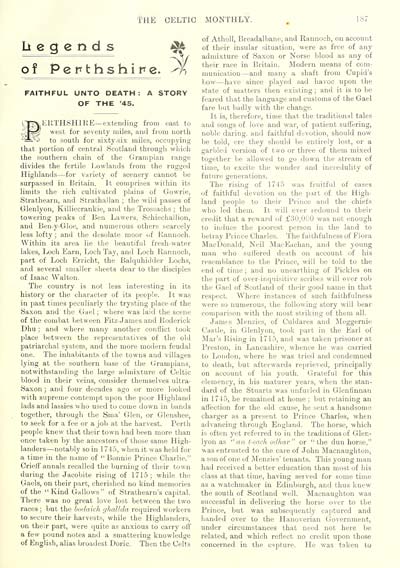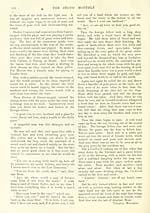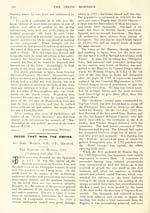Blair Collection > Celtic monthly > Volume 7, 1899
(269)
Download files
Complete book:
Individual page:
Thumbnail gallery: Grid view | List view

THE CELTIC MONTHLY.
187
h e g e n d s
of PePthshipe.
FAITHFUL UNTO DEATH : A STORY
OF THE '4-5.
^Tj;^liRTHSHIRE — extending from east to
^'f^ west for seventy miles, and from north
'^==^''''> to south for sixty-six miles, occupying
that portion of central Scotland through which
the southern chain of the Grampian range
divides the fertile l^owlands from the rugged
Highlands — for variety of scenery cannot be
surpassed in Britain. It comprises within its
limits the rich cultivated plains of Gowrie,
Strathearn, and Strathallan ; the wild passes of
Ulenlyon, Killiecrankie, and the Tros.sachs; the
towering peaks of Ben Lawers, Sohiechallion,
and Ben-y-Gloe, and numerous others scarcely
less lofty ; and the desolate moor of Rannoch.
Within its area lie the beautiful fresh-water
lakes. Loch Earn, Loch Tay, and Loch Rannoch,
part of Loch Erricht, the Balquhidder Lochs,
and several smaller sheets dear to the disciples
of Isaac Walton.
The country is not less interesting in its
history or the character of its people. It was
in past times peculiarly the trysting place of the
Saxon and the Gael ; where was laid the scene
of the combat between Fitz-James and Roderick
Dhu ; and where many another conflict took
place between the representatives of the old
patriarchal system, and the more modern feudal
one. The inhabitants of the towns and villages
lying at the southern base of the (Jrampians,
notwithstanding the large admixture of Celtic
blood in their veins, consider themselves ultra-
Saxon ; and four decades ago or more looked
with supreme contempt upon the poor Highland
lads and lassies who used to come down in bands
together, through the Sma' Glen, or Glenshee,
to seek for a fee or a job at the harvest. Perth
people knew that their town had been more than
once taken by the ancestors of those same High-
landers — notably so in 1745, when it was held for
a time in the name of "Bonnie Prince Charlie."
Crietf annals recalled the burning of their town
during the Jacobite rising of 171.5; while the
Gaels, on their part, cherished no kind memories
of the " Kind Gallows " of Strathearn's capital.
There was no great love lost between the two
races ; but the bodaich ghallda required workers
to secure their harvests, while the Highlanders,
on their part, were quite as anxious to carry oft'
a few pound notes and a smattering knowledge
of English, alias broadest Doric. Then the Celts
of Atholl, Breadalbane, and Rannoch, on account
of their insular situation, were as free of any
admixture of Saxon or Norse blood as any of
their race in Britain. Modern means of com-
munication — and many a shaft from Cupid's
bow — have since played sad havoc upon the
state of matters then existing ; and it is to be
feared that the language and customs of the Gael
fare but badly with the change.
It is, therefore, time that the traditional tales
and songs of love and war, of patient suftering,
noble daring, and faithful devotion, should now
be told, ere they should be entirely lost, or a
garbled version of two or three of them mixed
together be allowed to go down the stream of
time, to excite the wonder and incredulity of
future generations.
The rising of 174.5 was fruitful of cases
of faithful devotion on the part of the High-
land people to their Prince and the chiefs
who led them. It will ever redound to their
credit that a reward of £30,000 was not enough
to induce the poorest person in the land to
betray Prince Charles. The faithfulness of Flora
MacDonald, Neil MacEachan, and the young
man who sutlered death on account of his
resemblance to the Prince, will be told to the
end of time ; and no unearthing of Pickles on
the part of over-inquisitive scribes will ever rob
the Gael of Scotland of their good name in that
respect. Where instances of such faithfulness
were so numerous, the following story will bear
comparison with the most striking of them all.
James Menzies, of Culdares and Meggernie
Castle, in Glenlyon, took part in the Karl of
Mar's Rising in 1715, and was taken prisoner at
Preston, in Lancashire, whence he was carried
to London, where he was tried and condemned
to death, but afterwards reprieved, principally
on account of his youth. Grateful for this
clemency, in his maturer years, when the stan-
dard of the Stuarts was unfurled in Glenfinnan
in 1745, he remained at home ; but retaining an
affection for the old cause, he .sent a handsome
charger as a present to Prince Charles, when
advancing through England. The horse, which
is often yet referred to in the traditions of Glen-
lyon as " an t-each odliar " or " the dun horse,"
was entrusted to the care of John Macnaughton,
a son of one of Menzies' tenants. This young man
had received a better education than most of his
class at tiiat time, having served for some time
as a watchmaker in Edinburgh, and thus knew
the south of Scotland well. Macnaughton was
successful in delivering the horse over to the
Prince, but was subsequently captured and
lianded over to the Hanoverian Government,
under circumstances that need not here be
related, and which reflect no credit upon those
concerned in the capture. He was taken to
187
h e g e n d s
of PePthshipe.
FAITHFUL UNTO DEATH : A STORY
OF THE '4-5.
^Tj;^liRTHSHIRE — extending from east to
^'f^ west for seventy miles, and from north
'^==^''''> to south for sixty-six miles, occupying
that portion of central Scotland through which
the southern chain of the Grampian range
divides the fertile l^owlands from the rugged
Highlands — for variety of scenery cannot be
surpassed in Britain. It comprises within its
limits the rich cultivated plains of Gowrie,
Strathearn, and Strathallan ; the wild passes of
Ulenlyon, Killiecrankie, and the Tros.sachs; the
towering peaks of Ben Lawers, Sohiechallion,
and Ben-y-Gloe, and numerous others scarcely
less lofty ; and the desolate moor of Rannoch.
Within its area lie the beautiful fresh-water
lakes. Loch Earn, Loch Tay, and Loch Rannoch,
part of Loch Erricht, the Balquhidder Lochs,
and several smaller sheets dear to the disciples
of Isaac Walton.
The country is not less interesting in its
history or the character of its people. It was
in past times peculiarly the trysting place of the
Saxon and the Gael ; where was laid the scene
of the combat between Fitz-James and Roderick
Dhu ; and where many another conflict took
place between the representatives of the old
patriarchal system, and the more modern feudal
one. The inhabitants of the towns and villages
lying at the southern base of the (Jrampians,
notwithstanding the large admixture of Celtic
blood in their veins, consider themselves ultra-
Saxon ; and four decades ago or more looked
with supreme contempt upon the poor Highland
lads and lassies who used to come down in bands
together, through the Sma' Glen, or Glenshee,
to seek for a fee or a job at the harvest. Perth
people knew that their town had been more than
once taken by the ancestors of those same High-
landers — notably so in 1745, when it was held for
a time in the name of "Bonnie Prince Charlie."
Crietf annals recalled the burning of their town
during the Jacobite rising of 171.5; while the
Gaels, on their part, cherished no kind memories
of the " Kind Gallows " of Strathearn's capital.
There was no great love lost between the two
races ; but the bodaich ghallda required workers
to secure their harvests, while the Highlanders,
on their part, were quite as anxious to carry oft'
a few pound notes and a smattering knowledge
of English, alias broadest Doric. Then the Celts
of Atholl, Breadalbane, and Rannoch, on account
of their insular situation, were as free of any
admixture of Saxon or Norse blood as any of
their race in Britain. Modern means of com-
munication — and many a shaft from Cupid's
bow — have since played sad havoc upon the
state of matters then existing ; and it is to be
feared that the language and customs of the Gael
fare but badly with the change.
It is, therefore, time that the traditional tales
and songs of love and war, of patient suftering,
noble daring, and faithful devotion, should now
be told, ere they should be entirely lost, or a
garbled version of two or three of them mixed
together be allowed to go down the stream of
time, to excite the wonder and incredulity of
future generations.
The rising of 174.5 was fruitful of cases
of faithful devotion on the part of the High-
land people to their Prince and the chiefs
who led them. It will ever redound to their
credit that a reward of £30,000 was not enough
to induce the poorest person in the land to
betray Prince Charles. The faithfulness of Flora
MacDonald, Neil MacEachan, and the young
man who sutlered death on account of his
resemblance to the Prince, will be told to the
end of time ; and no unearthing of Pickles on
the part of over-inquisitive scribes will ever rob
the Gael of Scotland of their good name in that
respect. Where instances of such faithfulness
were so numerous, the following story will bear
comparison with the most striking of them all.
James Menzies, of Culdares and Meggernie
Castle, in Glenlyon, took part in the Karl of
Mar's Rising in 1715, and was taken prisoner at
Preston, in Lancashire, whence he was carried
to London, where he was tried and condemned
to death, but afterwards reprieved, principally
on account of his youth. Grateful for this
clemency, in his maturer years, when the stan-
dard of the Stuarts was unfurled in Glenfinnan
in 1745, he remained at home ; but retaining an
affection for the old cause, he .sent a handsome
charger as a present to Prince Charles, when
advancing through England. The horse, which
is often yet referred to in the traditions of Glen-
lyon as " an t-each odliar " or " the dun horse,"
was entrusted to the care of John Macnaughton,
a son of one of Menzies' tenants. This young man
had received a better education than most of his
class at tiiat time, having served for some time
as a watchmaker in Edinburgh, and thus knew
the south of Scotland well. Macnaughton was
successful in delivering the horse over to the
Prince, but was subsequently captured and
lianded over to the Hanoverian Government,
under circumstances that need not here be
related, and which reflect no credit upon those
concerned in the capture. He was taken to
Set display mode to: Large image | Transcription
Images and transcriptions on this page, including medium image downloads, may be used under the Creative Commons Attribution 4.0 International Licence unless otherwise stated. ![]()
| Early Gaelic Book Collections > Blair Collection > Celtic monthly > Volume 7, 1899 > (269) |
|---|
| Permanent URL | https://digital.nls.uk/75861553 |
|---|
| Shelfmark | Blair.59 |
|---|---|
| Additional NLS resources: | |
| Attribution and copyright: |
|
| Description | A selection of books from a collection of more than 500 titles, mostly on religious and literary topics. Also includes some material dealing with other Celtic languages and societies. Collection created towards the end of the 19th century by Lady Evelyn Stewart Murray. |
|---|
| Description | Selected items from five 'Special and Named Printed Collections'. Includes books in Gaelic and other Celtic languages, works about the Gaels, their languages, literature, culture and history. |
|---|

